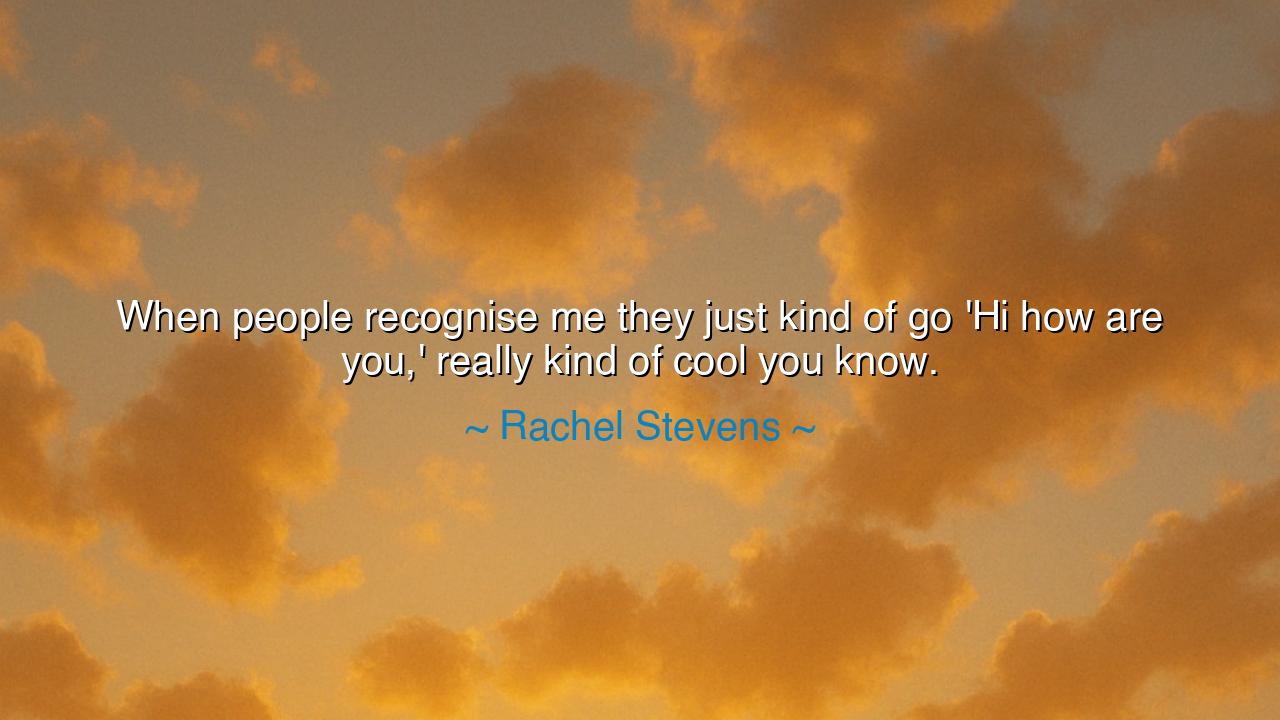
When people recognise me they just kind of go 'Hi how are you,'
When people recognise me they just kind of go 'Hi how are you,' really kind of cool you know.






"When people recognise me they just kind of go 'Hi how are you,' really kind of cool you know." These words, spoken by Rachel Stevens, carry within them a subtle reflection on the nature of celebrity, recognition, and the relationship between the public and the private self. Stevens' casual description of being recognized suggests an encounter that is both familiar and respectful, where her identity is acknowledged, but not idolized or overwhelmed. The coolness of the exchange reflects a balance between personal connection and the impersonal nature of celebrity. It speaks to the human need for respect, dignity, and personal boundaries, even when one's life is in the public eye.
In the ancient world, the idea of recognition and fame was often linked to virtue and service to the community. Figures like Alexander the Great or Julius Caesar were known far and wide, yet their fame carried with it a great responsibility to those they ruled. Recognition, for these ancient leaders, was a double-edged sword: it brought both admiration and expectations. Similarly, the philosopher Socrates, though not famous in the way we understand it today, gained recognition for his dedication to wisdom. Yet, Socrates valued his personal integrity more than the accolades of society. Like Stevens, he understood the importance of being recognized without being consumed by that recognition. The ancients knew that true greatness lay not in how many people knew you, but in how you carried yourself in the face of that knowledge.
Stevens' recognition experience, which seems simple and grounded, reminds us that fame should not elevate one above others but rather serve as a tool to communicate, to inspire, and to connect. The coolness of the interaction she describes speaks to a level of comfort and ease with herself, and a respect for the boundaries of others. Recognition does not need to be extravagant; it need not come with the weight of expectation or the pressures of performance. Like the great warriors and philosophers of old, who walked among the people without arrogance, Stevens embraces recognition in a way that honors both her humanity and the humanity of others. This is a quiet power, a grounded understanding that fame is but a passing element in the greater story of one’s life.
The lesson of Stevens' words is one of humility and presence. Recognition, whether from a passing stranger or from the world at large, does not define us. True worth lies in how we interact with others in the moment. The great leaders and thinkers of the ancient world were admired not for their titles, but for their ability to connect with people, to share wisdom, and to lead with integrity. Socrates did not demand respect; he earned it by the way he questioned, listened, and engaged with others. In this way, Stevens’ calm response to recognition serves as a modern reflection of ancient wisdom: we are not defined by the opinions of others, but by the way we remain true to ourselves in every moment.
Consider the story of Confucius, the great Chinese philosopher, who emphasized the importance of respecting others and cultivating humility. Despite being a renowned teacher, Confucius lived simply, focusing more on his disciples and the teachings he imparted than on the accolades or recognition he received. In his teachings, he spoke often of the virtue of sincerity, urging people to act from a place of truth and to cultivate inner peace. Recognition was simply a byproduct of his dedication to his craft, not the measure of his worth. Similarly, Stevens' response to recognition speaks to a quiet confidence and understanding that fame is temporary, but how one treats others is what endures.
The true power of Stevens' statement lies in the balance she strikes between being recognized and remaining grounded. In a world obsessed with fame and public approval, her calm demeanor offers a refreshing perspective. We can all learn from this: to acknowledge the gifts we have without being consumed by them, to embrace recognition without seeking validation from it. True greatness, as Confucius and other ancient sages taught, lies not in the applause we receive but in the humility with which we carry ourselves and the genuine connections we form with others.
In our own lives, we must aim to remain true to ourselves no matter how others recognize or define us. Let us not be distracted by the fleeting nature of fame or recognition, but focus instead on the quality of our actions and the way we engage with those around us. Whether we are famous or unknown, we can all embody the same calm confidence that Stevens describes: to be humble, to be present, and to treat others with the same respect we hope to receive. When we do this, we create lasting relationships and build a foundation of respect that transcends the transient nature of fame or recognition.






AAdministratorAdministrator
Welcome, honored guests. Please leave a comment, we will respond soon